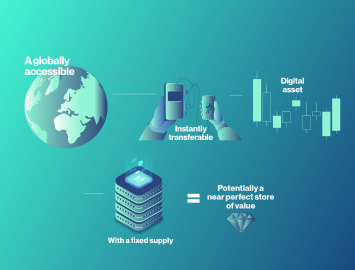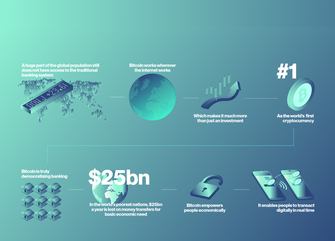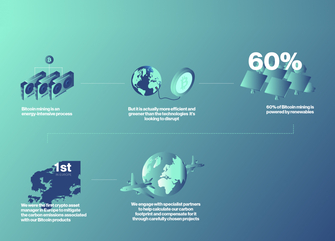These terms and conditions (the “ Terms ”) tell you the terms on which you may make use of our website https://etc-group.com/ (“ Website ”).
Please read these Terms carefully before using this Website. By using this Website, you are deemed to have read and accepted our Terms and Conditions as set out below. If you do not agree to these Terms, you must not use this Website.
Your attention is particularly drawn to the disclaimers and limitations of liability set out in the sections below headed: “ Disclaimer ”, “ No Offer ” and “ Limitation of Liability ”.
Information about us
The website is owned and operated by ETC Management Ltd, a company registered in England and Wales under number 12165332 with its registered office at Gridiron, One Pancras Square, London, England, N1C 4AG.
You can contact us by email at info@etc-group.com.
References to “ ETC Group ”, “ we ”, “ us ” and “ our ” in these Terms refers to ETC Management Ltd and our affiliates.
These Terms
These Terms constitute the agreement between you and us for the use of this Website and the contents and services available through it.
We may change these Terms from time to time. Any changes we may make to these Terms in the future will be posted on this Website and, where appropriate, notified to you by email. By continuing to use and access this Website following such changes, you agree to be bound by any changes we make. Please review this page frequently to see any updates or changes to these Terms.
If you commit a breach of these Terms, we reserve the right at our sole discretion to immediately and without notice suspend or permanently deny your access to all or part of this Website.
Website
We provide this Website on an "as is" and "as available" basis with all faults. We do not guarantee that this Website, or any services or content on it, will always be available or be uninterrupted. We may suspend, withdraw, discontinue or change all or any part of this Website without notice. You agree that your use of this Website is at your own risk. We will not be liable to you if for any reason this Website is unavailable at any time or for any period.
You are responsible for ensuring that all persons who access this Website through your internet connection are aware of these Terms and other applicable terms and conditions, and that they comply with them.
We may update and change this Website from time to time to reflect changes to our products and services, our users' needs and our business priorities.
Distribution of Information
The distribution of the information and material on this Website may be restricted by law in certain countries. None of the information is directed at, or is intended for distribution to, or use by, any person or entity in any jurisdiction (by virtue of nationality, place of residence, domicile or registered office) where publication, distribution or use of such information would be contrary to local law or regulation.
You must inform yourself about and observe any such restrictions in your jurisdiction. By accessing this Website you represent that you have done so. By accepting these Terms, you hereby confirm that you are allowed to access this Website pursuant to applicable laws.
Lawful use
You may use this Website only for lawful purposes. You must not use this Website in any way that breaches any applicable local, national or international law or regulation, or in any way that is unlawful or fraudulent or has any unlawful or fraudulent purpose or effect.
You must not use or attempt to use any automated program (including, without limitation, any spider or other web crawler) to access our system or this Website. You must not use any scraping technology on this Website.
Disclaimer
Certain documents made available on this Website may have been prepared and issued by persons other than ETC Group. This includes any prospectus and additional documents thereto. ETC Group is not responsible in any way for the content of any such document.
While we take all reasonable care to ensure the information and analysis which we publish on this Website are as accurate as possible, we cannot promise that they will be complete, accurate and up to date.
Opinions and any other contents on this Website are provided by us for informational purposes only and are subject to change without notice. We are not giving you any advice (investment, financial, legal or otherwise) in respect of any of the information on this Website. You should obtain professional or specialist advice before taking, or refraining from, any action based on any information on this Website. Any reliance that you may place on the information on this Website is at your own risk.
To the maximum extent permitted by law, we disclaim any and all implied conditions, warranties and representations that this Website and the information and services available through it are of satisfactory quality, accurate, fit for a particular purpose, or non-infringing.
No offer
Nothing on this Website should be construed as an offer, or recommendation, to purchase or dispose of any product or securities. The prices and valuations published on this Website are indicative and are for information purposes only, as is other information displayed on this Website.
Any person making offer of securities described on this Website shall observe and strictly comply with restrictions on the usage of information pursuant to these Terms, as well as any restriction imposed by a prospectus published with respect of any securities described or applicable laws and regulation, including without limitation restrictions imposed by the EU Prospectus Regulation (REGULATION (EU) 2017/1129 OF THE EUROPEAN PARLIAMENT AND OF THE COUNCIL of 14 June 2017).
Authorised Investors
Some documents displayed on this Website and its content are restricted to “Professional Investors” only and are not intended for retail or private investors. By making use, opening, or downloading such documents, you agree that you are an “Institutional Investor” (as defined here: https://www.handbook.fca.org.uk/handbook/COBS/3/5.html), and have read, understood and accepted the conditions.
The securities described on this Website are not permitted to be offered for sale in all countries and are in each case reserved for investors who are authorised to purchase the securities. Selling restrictions applicable to specific products are set out in the relevant prospectus and should be read carefully by investors. Any restrictions imposed by the relevant prospectus are in addition and without prejudice to any restriction or prohibition established by laws or regulations of any jurisdiction.
United States Persons and legal entities resident in the United States
Securities issued by ETC Group have not been registered under the U.S. Securities Act of 1933, as amended, (the "Securities Act"). The Bonds are being offered outside the United States of America (the "United States" or "U.S.") in accordance with Regulation S under the Securities Act ("Regulation S"), and may not be offered, sold or delivered within the United States except pursuant to an exemption from, or in a transaction not subject to, the registration requirements of the Securities Act.
The information provided on this Website is not directed to any United States person or legal entity or any state thereof, or any of its territories or possessions.
U.S. PERSONS (AS DEFINED IN REGULATION S) AND LEGAL ENTITIES RESIDENT IN THE UNITED STATES MAY NOT ENTER THIS WEBSITE.
Information from this Website may not be distributed or redistributed into the United States or into any jurisdiction where it is not permitted.
Limitation of liability
ETC Group shall not be responsible for any damage (including, without limitation, damage for loss of business or loss of profits) arising in contract, tort or otherwise from the use of, or inability to use, this Website or any material contained in it, or from any action or decision taken as a result of using this Website or any such material.
We do not exclude or limit in any way our liability to you where it would be unlawful to do so. This includes liability for death or personal injury caused by our negligence or for fraud or fraudulent misrepresentation.
Viruses
We do not guarantee that this Website will be secure or free from bugs or viruses.
You are responsible for configuring your information technology, computer programmes and platform in order to access this Website. You should use your own virus protection software.
You must not misuse this Website by knowingly introducing viruses, trojans, worms, logic bombs or other material which is malicious or technologically harmful. You must not attempt to gain unauthorised access to this Website, the server on which this Website is hosted or any server, computer or database connected to this Website.
Risk Warnings
You should always bear in mind that:
- Cryptoassets are a highly volatile asset class. Your capital is at risk. The value of cryptoassets can go down as well as up and you can lose your entire investment.
- Past performance is not an indication of future performance.
- Rates of exchange may affect the value of investments.
- Applications to invest in securities referred to on this website must only be made on the basis of the relevant prospectus.
Investors should refer to the section entitled “Risk Factors” in the relevant prospectus for further details of these and other risks associated with an investment in the securities offered by the Issuers before investing.
Copyright
All content and the design of this Website are owned by ETC Group or our licensors and protected by copyright and other applicable laws.
Any copying of the website or of its content requires the prior written consent of ETC Group.
Your Privacy
ETC Group respects the privacy of users. Please see our Privacy Policy for information setting out how we handle personal information collected through the Website.
Hyperlinks
Some of the hyperlinks contained on the Website may lead the user to external websites that are not under the control of ETC Group. ETC Group does not approve or endorse the contents of such websites and does not control the content of any such websites. When the user clicks on such a link, the user will leave the Website. ETC Group is not responsible for the content of any websites reached by means of such a link.
Governing Law and Jurisdiction
These Terms and Conditions and your access to and use of this Website and the content are subject to the laws of England and Wales. However, if you are a consumer resident in another part of the UK or in any EU country, then you will also be entitled to any additional protection afforded to you under your national consumer protection laws.
You can bring legal proceedings in respect of these Terms in the English courts or, if you are a consumer resident in another part of the UK or in any EU country, the courts of your home country.







